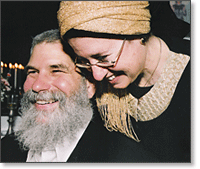The previous portion, Eikev, begins this trend by alluding to the
upcoming days of repentance in its first verse: “And it shall come to pass (eikev)
if you listen to these judgments and keep and do them” (Deuteronomy 7:12). The word “eikev” also
contains the Hebrew root for the words “heel” and “footsteps.” The heel, at the
end of the body, represents the upcoming end of the year. If we listen
carefully and are in tune with the change of the seasons and the inner
dimensions of the Jewish calendar, we can already faintly hear in the distance
the “footsteps” of a new year.
The portion of Re’eh begins: “See – I put before you this day a blessing
and a curse. A blessing if you listen to the commandments of your God, which I
command you this day; and a curse if you do not listen to the commandments of
your God” (Deuteronomy 11:26). The Torah instructs people to keep their eyes wide open, to clearly examine the
choices life presents them with, and to accept responsibility for the
consequences of these choices. As we begin the month of Elul and start
preparing for the Days of Awe we must do so fully aware of what is at stake.
The next portion, Shoftim, begins with the following words: “Judges and
officers you shall appoint in all your gates” (Deuteronomy 16:18). Although this injunction clearly applies
to society at large, Chassidic thought relates it to the private realm as well.
At this time of year when introspection is called for, the Torah is reminding
us to appoint internal judges and officers and to begin judging our own
thoughts, speech, and action by appointing internal officers to enforce
discipline and undertake pragmatic change when necessary. The “judges” are the
soul forces within us that recognize the truth and provide us with a plan to
change ourselves for the better, while the “officers” enforce discipline and
spur us on, providing us with the fortitude necessary to truly improve
ourselves.
In order to bring about change we need to be ready to go to “war,” to confront
those internal stumbling blocks preventing us from advancing spiritually.
Fundamental change does not come easily and only great determination will
enable us to attain our personal goals. Therefore the next portion Ki
Teitzei begins with the following injunction: “When you go forth in war
against your enemy and God, your God, has delivered them into your
hands….” (Deuteronomy 21:10). Here again, Chassidic thought transfers the
commandment from the sociopolitical realm to the private one, emphasizing that
on an individual level the enemy is the “evil inclination” and those character
traits in need of rectification. When we make a real effort to confront our
enemy, the evil inclination, then God comes to our aid.
Ki Teitzei, continues by discussing how to treat a beautiful woman,
captured in the course of a war, whom one is strongly attracted to. The Torah
explains how to deal with this situation and how a man can successfully control
his physical desires in a holy way, and likewise, the possible consequences if
he does not handle the situation in the purest of ways possible. On a personal
level when we break the spell of complacency and confront our inner
shortcomings there is always the possibility of success or failure. War is war,
not fun and games. We must be aware and careful when capturing our internal
enemies and be prepared to deal with the issues that come up in a sincere and
realistic manner. When we do so in the name of true rectification, Divine
assistance is forthcoming.
Even though the teshuvah process we are describing requires serious spiritual
work, Chassidut reminds us not to lose sight of the fundamental sense of joy
that should pervade all Divine service. Furthermore, it reminds us not to
become so involved in the process that we lose sight of where we are heading.
The next portion, Ki Tavo, reminds us of this by beginning with the
following descriptive passage: “And it will be (vehayah) when you come
into the Land which God, your God, gives you for an inheritance”
(Deuteronomy 26:1). Our Sages have noted that when a book or Torah portion
begins with the word “vehayah,” this signals great joy. The Jewish people’s
greatest joy is entering and taking possession of the Promised Land. On a
private level, this entering the Land, figuratively represents the great joy
found in attaining one’s goals, especially when they are pure and holy.
Chassidut teaches that we need to approach Rosh Hashanah and the Ten Days of
Repentance with joy as well as with awe.
On the Shabbat before Rosh Hashanah, we always read the portion of Nitzavim
which begins with the stirring words, “And you are standing today, all of you,
before God” (Deuteronomy 29:9). The Zohar states that this verse is
actually referring to Rosh Hashanah. We can only stand before God on Rosh
Hashanah with an undivided heart and a clear conscience if we maximize the
opportunity provided by Elul. The portions leading up to the Days of Awe
carefully instruct us in how to maximize these days and perform the essential
spiritual work that must be undertaken. If we listen and internalize their
messages, we fulfill the dictum of “living with the times” in its highest form.

No comments:
Post a Comment